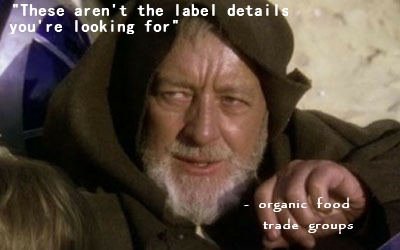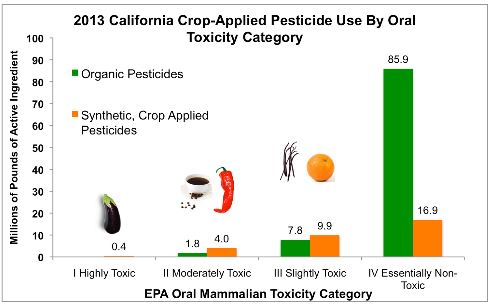Earlier this month I was invited to appear on Michael Olson's Food Chain radio program with Kelly Damewood, Policy Director at California Certified Organic Farmers, to talk about Campbell Soup Co. and its desire to put GMO labels on its cans.
(I wrote about that here and about the organic process versus the conventional process in general. You can listen while you read, if you like.)
While things generally went fine, there were a few times where Ms. Damewood got a little too advertorial about her clients and her group, but that's to be expected. The only real panic moment for her was when I said food transparency -- labeling -- should include everything, like pesticides, and she immediately objected and said the organic label already assumed organic pesticides, so no mention of that was necessary. Now, she had just said companies were afraid to put GMOs on their labels, but they should have to do it, and suddenly she was afraid that her customers might have to list pesticides.
"We don't need to do that!" she interrupted (around 30:25 if you want to skip ahead in listening).
Ironically, this was right after she extolled organic food as being a superior "whole system approach" -- and she was suddenly contradicting herself and saying customers didn't need to have transparency about that part of the system, because a trade group certifying people who pay them was going to be enough.
 Credit: Disney
Credit: Disney
Mr. Olson went to commercial when she began to sputter, and then changed topics after the break. But it doesn't remove the question, namely, why an organic advocate would not want more information on labels, to help customers really know what goes into their food.
She had previously suggested that 90 percent of people want to know about GMOs on labels -- which is a carefully framed claim (and incorrect, but that's fine, since she was speaking off the cuff, even the host seemed shocked by that number; it is instead around 70 percent when asked). It is framed badly, because unprompted, the number who care about GMOs is a fraction of that, 7 percent, despite organic corporations spending hundreds of millions of dollars to try and promote fear about food science. But what people uniformly do want to know, even unprompted, is what chemicals were used in the process of growing food.
The science-literate community knows why an organic industry rep would panic over pesticides on labels -- they promote the notion that their clients use "no chemicals," when they simply use toxic pesticides that have an organic seal of approval. Organic or synthetic is irrelevant when it comes to toxicity. LD50 (the dose needed to kill 50 percent of test animals) used to establish acute toxicity, is still LD50, be it from a chemical that is an organic toxic pesticide or a synthetic one.
Both Mr. Olson and Ms. Damewood mentioned glyphosate, because that is the scary, go-to product for the organic food community. They may think it is dangerous because the United Nations International Agency for Research on Cancer (IARC) listed glyphosate as Probably Carcinogenic to humans (Group 2A), and that it must be settled science. But IARC listed sausage as a Group 1 carcinogen -- its highest cancer-causing agent, the same as cigarettes, mustard gas and asbestos. Anyone claiming glyphosate is a risk based on an IARC claim doesn't understand what IARC does, which is simply to find a hazard and does not consider actual risk.
If you just want to see relative hazard, look at this graphic by Dr. Cami Ryan (disclosure: she is of Monsanto, so if the source of science matters you can go right to Vast Conspiracy Argumentum ad Monsantium rebuttals). Glyphosate is less toxic than chocolate, but you'd better wear a haz-mat suit if you are using Certified Organic rotenone.

Even relative charts like this don't tell the real story, because hazard alone does not tell us risk. The real story is the No Effect Level (NOEL) of pesticides. To get past the NOEL of glyphosate, you would have to eat over 6,000 pounds of vegetables per day. What about trace amounts over time -- the hormesis argument -- which anti-science groups invoke as a way of indicting pesticides that can't harm anyone in ordinary use? You should be more worried about drinking even one cup of coffee per day. As our now-famous ACSH coffee cup shows, the relative toxicity of caffeine makes it far more dangerous than products environmental trade groups raise money scaring people about.
 Credit: American Council on Science and Health
Credit: American Council on Science and Health
So, despite what organic trade groups want us to believe, people are worried about pesticides, both organic and synthetic. Chemistry is awesome, but like any tool it can be misused, especially by organic farmers over-spraying. Anyone who grew up on a farm thinks you should wash your food, even if the organic pesticide used is only mildly toxic. And if the farm is organic on the input side you really need to wash it, or you will vomit like you just ate at a Chipotle, because they use feces.
Given the concern we all know the public has, why would an organic trade group insist its paid certification should be enough transparency for its consumers and that the public shouldn't want details about the chemicals on their food?
Because transparency about organic food, and actual fact checking about pesticide use, would reveal this.
 Credit: Genetic Literacy Project
Credit: Genetic Literacy Project
Organic pesticides are not very good, so farmers end up using a whole lot more chemicals, and that is while growing only a fraction of America's food supply. They have to comparatively bathe plants in chemicals to not have their crops ruined. Organic pesticides in California need 300 percent more to grow a fraction of the food.
And Big Organic would really rather their customers not know about it.
In the 13 years that Certified Organic has existed, it has grown into a monstrous business (over $100 billion worldwide) and that means there are a lot of companies making money on labels, and to keep that money coming in they have to defend Big Organic practices, even if it must be distasteful, like lobbying against labels that would make organic food look bad.
This is not to pick on Ms. Damewood or California Certified Organic Farmers, she was positively rational compared to people like Lisa Graves of SourceWatch and U.S. Right To Know, which respond to any facts about food or its groups with threats of lawsuits, while using their websites to try and bully scientists and pro-science groups into submission.
But the problem remains that even well-meaning groups are all using the same lawyer-approved strategies: They want to gain a competitive advantage using legislative fiat. They always, in political nomenclature terms, "go negative" about their competition. To the neutral public it smacks of hypocrisy that groups advocating a skull-and-crossbones-type label for food that contains GMOs protest against pesticide awareness when the public clearly wants it.
The reality that organic growers use far more pesticides than are used by GMO crops is even more reason why any labels about any food process should include pesticides used throughout the food chain. If we really care about creating informed consumers, that is.
I do want to thank Mr. Olson and Ms. Damewood for the chance to speak to their audience. The American Council and CCOF both support farmers. The distinction is that we support all farmers, I have said the profitability of organic farming and growing customer demand is why more conventional farmers should consider it -- while they only support the ones who cut them a check and the rest are the enemy.



